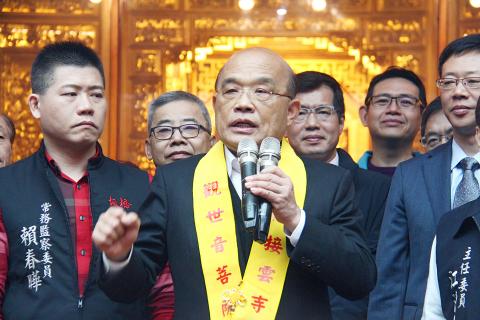“To save others, you must save yourself first,” Premier Su Tseng-chang (蘇貞昌) said yesterday as he defended the government’s decision to ban exports of N95 respirators and other masks for one month.
To ensure local supply of masks amid fears that the 2019 novel coronavirus (2019-nCoV) could spread domestically, the Customs Administration on Friday banned exports of all masks made of woven materials until Feb. 23.
The ban came in the wake of the worsening 2019n-CoV outbreak, as China first tried to conceal the disease, and has performed poorly in trying to contain it, Su said.

Photo: Chiu Shu-yu, Taipei Times
The government’s decision has drawn criticism, with media personality Joyce Huang (黃智賢) calling Su “inhumane” on Facebook for formulating the ban.
However, the premier yesterday again condemned China’s repeated sidelining of Taiwan at the WHO, and barring its participation unless it acknowledges Beijing’s “one China” principle, making it unable to share its knowledge, information and experience with the world.
As disease prevention knows no boundaries, Beijing’s boycott is wrong, regrettable and exposes China’s willfulness and irrationality, he added.
Meanwhile, the Central Epidemic Command Center yesterday warned patrons and staff of Jin Bali Grand Ballroom (金芭黎舞廳) in Kaohsiung’s Lingya District (苓雅) that they might have been exposed to the virus, as a Taiwanese businessman in his 50s, who was one of two people on Friday confirmed to have 2019n-CoV, was at the club on Wednesday from 4pm to 6pm.
As the man had not worn a mask, the center said it wanted to alert people who might have come into close contact with him to monitor their health for 14 days.
If they develop a fever or start coughing or hyperventilating, they should immediately call the tollfree 1922 hotline and list the places they have visited, it said.
Kaohsiung Department of Health specialist Pan Chao-ying (潘炤穎) said a female employee of the ballroom developed symptoms of a respiratory infection yesterday morning and sought treatment, adding that the ballroom closed yesterday for at least two days and has begun disinfecting its premises.
The businessman would be fined NT$300,000 for violating the Communicable Disease Control Act (傳染病防治法) by not reporting that he had symptoms of an upper respiratory infection when he arrived at Kaohsiung International Airport on Tuesday, Pan said.
The health of people that the man has been in contact with since his return would be monitored until Feb. 5, Pan added.
The other case confirmed on Friday is a Chinese woman who is part of an 18-person tour group from Wuhan.
The rest of the group were scheduled to leave Taiwan yesterday, Tourism Bureau division head Liu Shih-min (劉士銘) said.
As of 3pm yesterday, 193 cases of people displaying pneumonia-like symptoms have been reported, of which three had been confirmed to have 2019-nCoV, while the virus has been ruled out in 64 cases and 126 people remain under quarantine, the center said.
Additional reporting by CNA

The US government has signed defense cooperation agreements with Japan and the Philippines to boost the deterrence capabilities of countries in the first island chain, a report by the National Security Bureau (NSB) showed. The main countries on the first island chain include the two nations and Taiwan. The bureau is to present the report at a meeting of the legislature’s Foreign Affairs and National Defense Committee tomorrow. The US military has deployed Typhon missile systems to Japan’s Yamaguchi Prefecture and Zambales province in the Philippines during their joint military exercises. It has also installed NMESIS anti-ship systems in Japan’s Okinawa

‘WIN-WIN’: The Philippines, and central and eastern European countries are important potential drone cooperation partners, Minister of Foreign Affairs Lin Chia-lung said Minister of Foreign Affairs Lin Chia-lung (林佳龍) in an interview published yesterday confirmed that there are joint ventures between Taiwan and Poland in the drone industry. Lin made the remark in an exclusive interview with the Chinese-language Liberty Times (the Taipei Times’ sister paper). The government-backed Taiwan Excellence Drone International Business Opportunities Alliance and the Polish Chamber of Unmanned Systems on Wednesday last week signed a memorandum of understanding in Poland to develop a “non-China” supply chain for drones and work together on key technologies. Asked if Taiwan prioritized Poland among central and eastern European countries in drone collaboration, Lin

The Chien Feng IV (勁蜂, Mighty Hornet) loitering munition is on track to enter flight tests next month in connection with potential adoption by Taiwanese and US armed forces, a government source said yesterday. The kamikaze drone, which boasts a range of 1,000km, debuted at the Taipei Aerospace and Defense Technology Exhibition in September, the official said on condition of anonymity. The Chungshan Institute of Science and Technology and US-based Kratos Defense jointly developed the platform by leveraging the engine and airframe of the latter’s MQM-178 Firejet target drone, they said. The uncrewed aerial vehicle is designed to utilize an artificial intelligence computer

Renewed border fighting between Thailand and Cambodia showed no signs of abating yesterday, leaving hundreds of thousands of displaced people in both countries living in strained conditions as more flooded into temporary shelters. Reporters on the Thai side of the border heard sounds of outgoing, indirect fire yesterday. About 400,000 people have been evacuated from affected areas in Thailand and about 700 schools closed while fighting was ongoing in four border provinces, said Thai Rear Admiral Surasant Kongsiri, a spokesman for the military. Cambodia evacuated more than 127,000 villagers and closed hundreds of schools, the Thai Ministry of Defense said. Thailand’s military announced that